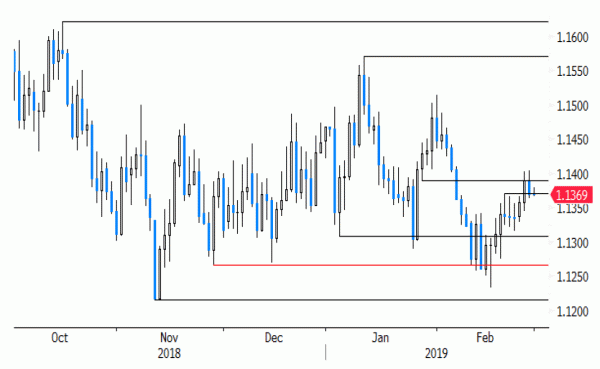- Rates: First resistance in German 10-yr yield at risk of break
Core bonds sold off yesterday with UK Gilts leading the way lower as the prospect of a no deal brexit fades. The German 10-yr yield tested first resistance at 0.15%. Today’s national inflation readings could cause a break with Bund underperforming US Treasuries in a daily perspective. Recent ECB comments show no desire to change policy (guidance) next week. - Currencies: Will balance between US and EMU data support further EUR/USD gain?
The tentative USD decline/rise of the euro slowed yesterday as there was no important news to force a EUR/USD break beyond 1.14. Today, EMU CPI’s and US Q4 GDP will be published. A bottoming in EMU CPI’s and a soft US GDP might support the gradual EUR/USD uptrend. Sterling stays well bid. How much good news on Brexit is currently discounted?
The Sunrise Headlines
- US equity markets were mixed to negative with Nasdaq outperforming (+0.07%). Asian equities were broadly mixed overnight until US/North Korean nuclear talks wrapped up sooner than expected, sending bourses south.
- The US Trade Rep. Lighthizer said that the US and China settled on a process for enforcing a (possible) trade agreement between the countries. He added that it is still too early to tell if China will concede to US demands.
- US President Trump and North Korean leader Kim Jong Un abruptly wrapped up negotiations in Vietnam, without a public joint statement. The US said no agreement was reached but talks had been “good and constructive”.
- Federal Reserve chairman Jerome Powell confirmed that the balance sheet normalization could be ended by the end of this year. In that case, the balance sheet would be 16-17% of GDP, up from about 6% before the financial crisis.
- ECB governor François Villeroy warned for keeping interest rates below zero for too long as it may hinder the ECB’s policy from dripping to the economy. He therefore thinks a normalization of monetary policy is still “desirable”.
- China’s manufacturing sector contracted further in February, with the PMI down to 49.2 from 49.5 a month before and below 50 for a third straight month. The non-manufacturing component decreased to 54.3, down from 54.7.
- Today’s US eco calendar contains US Q4 GDP results, weekly jobless claims and the Chicago PMI for February. Germany, France, Spain and Italy print February inflation numbers. Fed’s Clarida, Bostic, Kaplan and Harker speak
Currencies: Will Balance Between US And EMU Data Support Further EUR/USD Gain?
Will data support further EUR/USD gains?
There was tentative USD softness on FX markets earlier this week while the euro enjoyed a cautious bid. Both ‘trends’ halted yesterday, but there was no big countermove. EC confidence suggested that the downturn in the region might be slowing. ECB speakers kept the line that the recent, supposed temporarily economic slowdown still allows the ECB to consider first cautious steps to policy normalization in a not-that-distance future. EUR/USD retested the 1.14 area, but the test was rejecte (close at 1.1370). USD/JPY reversed earlier losses as US yields rose and as sentiment on risk improved gradually. USD/JPY finished at 111.00. Overnight, Chinese PMI’s printed again soft, with the manufacturing measure holding below the 50 level. However, the number was not that far from consensus. Asian equities initially showed a mixed picture, but sentiment deteriorated as president Trump and Kim Jong Un abruptly ended their meeting in Hanoi without a joined statement, raising geopolitical uncertainty in the region. The yen rose slightly with USD/JPY trading in the 110.75 area. EUR/USD is trading little changed in the 1.1370/75 area. The yuan is trading in the 6.6850 area. Today, several EMU countries including Germany and France will release February CPI data. Signs of a bottoming out process might support the idea that a start of ECB policy normalisation might still be on the table at the end of 2019 or early 2020 and might be a tentative euro supportive. In the US, the Q4 GDP release will be published. A modest rise (2.2%) is expected. As soft figure (e.g. <2.0%) would confirm that the Fed has the time to consider further policy steps and could be a tentative negative for the dollar. Geopoltical tensions (US-North Korea) area a wildcard, but we don’t expect it to be a big topic for EUR/USD. We started this week with a cautious bias on the US dollar as the US currency mighty become (slightly) more sensitive to soft US data. Last week, EUR/USD rebounded but unconvincingly. Any EUR/USD rebound will develop slowly as long as EMU data stay unconvincing. Still, we see room for EUR/USD to extend gains in the 1.12/1.15 trading range.
Yesterday, the sterling rebound/short squeeze simply continued. EUR/GBP dropped below the 0.8550 handle. At the Brexit debate in the UK Parliament yesterday, May’s Brexit timetable was not really challenged. Today, Brexit headlines might move a bit to the background and eco data probably won’t change the global picture for sterling trading. Sterling had a good run of late and quite some ‘good news’ on Brexit is discounted. Some consolidation might be on the cards.
EUR/USD testing the 1.14 big figure, but no sustained break (yet?)

